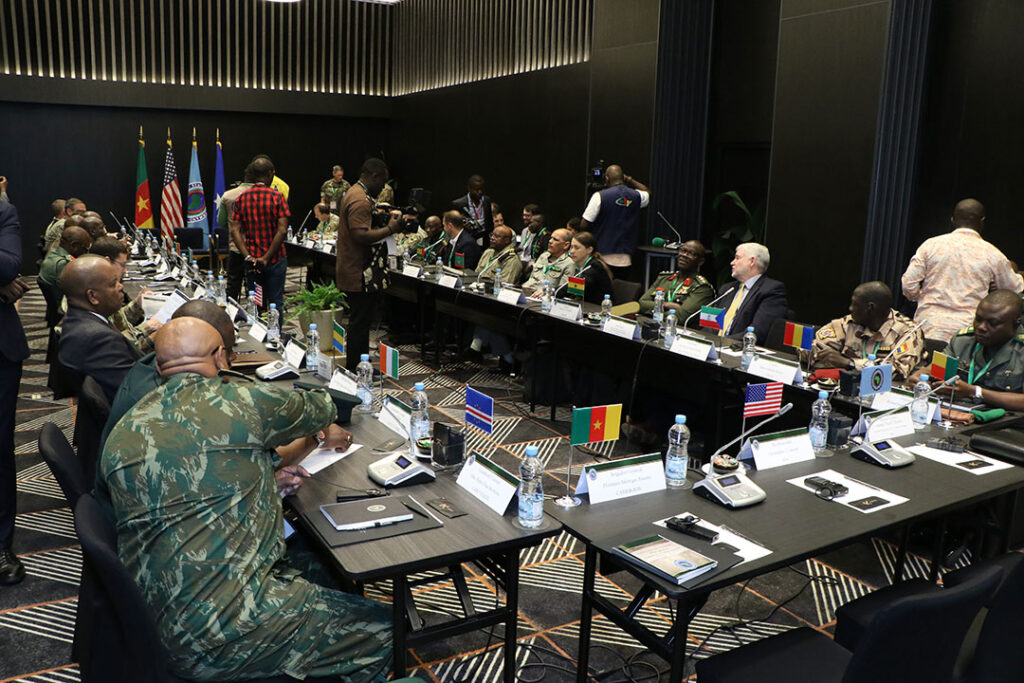ADF STAFF
A time-worn military adage says: “Amateurs talk strategy; professionals talk logistics.” Experienced leaders know that without solid logistics, any military plan is destined to fail.
That philosophy was at the heart of the 2024 West African Logistics Conference held recently in Douala, Cameroon. The Cameroonian Armed Forces and U.S. Africa Command sponsored the two-day event.
The region’s second annual logistics conference brought together more than 60 West African and U.S military logistics leaders to address the challenges they face in support of military missions, whether they are to counter extremists and transnational criminals or to address humanitarian crises.
Attendees came from Benin, Cabo Verde, Cameroon, Chad, Côte d’Ivoire, Gabon, Ghana, Guinea, Guinea-Bissau, Liberia, Mauritania, Nigeria, Sao Tome and Principe, Senegal, Sierra Leone, The Gambia, Togo, the African Union, and the Economic Community of West African States.
“We’ve had very fruitful discussions,” Ghanaian Army Col. James Amenyah said during the conference. “It’s the beginning of great things ahead.”
Military logistics experts keep their troops fed, clothed and armed. They acquire, store and dispose of materiel. They move troops and supplies and maintain the facilities that help the front-line forces to do their work.
“Logistics are foundational,” AFRICOM Commander Gen. Michael Langley said in a video address to the conference. “Our ability to fight depends on our ability to sustain the fighting force.”
African militaries face a multitude of logistical challenges when they deploy troops across a vast continent with limited port, road and rail systems. A lack of strategic airlift also makes it difficult to move troops and their supplies.
Retired Col. Daniel Hampton, an analyst with the Africa Center for Strategic Studies, has described the continent as having “the most operationally and logistically challenging conditions in the world.”
Overcoming those challenges is expensive both in terms of money and manpower.
“Without a strong logistics system, their complex, shifting, and expansive mandates cannot be delivered effectively,” Col. Hampton wrote in an analysis of African militaries’ logistical challenges. As a result, military logisticians must be adaptable and innovative if they are to overcome the obstacles that threaten to disrupt their work, experts say.
As African nations shoulder more of the burden of peacekeeping on the continent, effective and efficient logistics need to become a priority for the governments contributing to those efforts, analysts say. Projects such as the African Union’s proposed African Standby Force or regional deployments such as the Southern African Development Community’s mission in the Democratic Republic of the Congo hinge on the ability to supply troops over large distances and in difficult terrain.
The 2024 logistics conference emphasized the notion of regional cooperation and coordination to help military logisticians meet and overcome the challenges they face.
“The core logistics tenets needed to confront these challenges remain unchanged — our charge is to get our customers what they need, where they need it, and when they need it,” Brig. Gen. Dutch Dietrich, director of logistics for AFRICOM, told the participants. “Maintaining strong relationships, coordinating our actions and enhancing interoperability will allow us to achieve our mutual objectives of ensuring the safety and security of our people.”
Over the course of the conference, the participants agreed to develop a platform to share information and work together to find solutions to their challenges.
“This platform will naturally allow us to answer a lot of questions that were raised during this conference,” Lt. Col. Bio Gounoukperou of the Logistics Support Division of the General Staff of the Beninese Armed Forces, said during the conference. The goal, he added, is to return to next year’s conference with concrete answers to the logistical challenges West African militaries face.
Above all, Lt. Col. Olivier Dedi, head of the transportation battalion for the Ivorian Armed Forces said, West African nations must collaborate on logistics if they are to succeed.
“Security is no longer national,” he said. “It is becoming collective. We have to work together to pool our efforts and our knowledge to achieve the common goal of peace in the world.”

